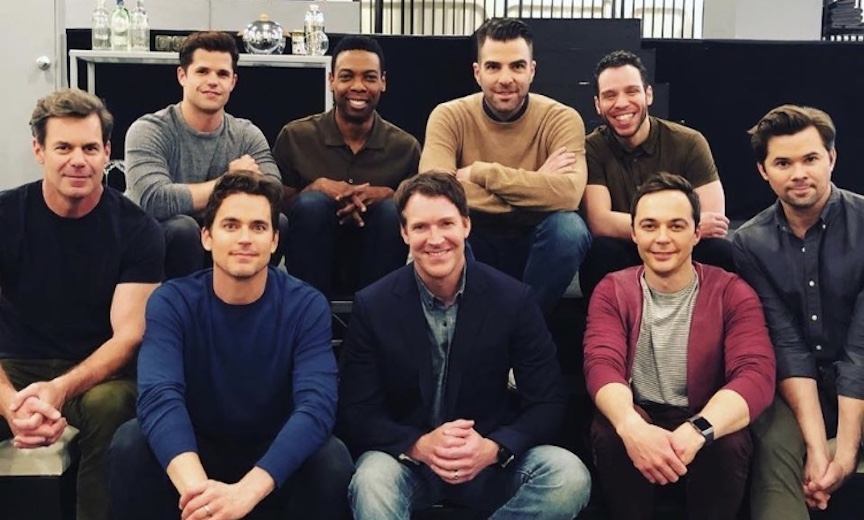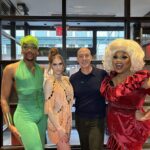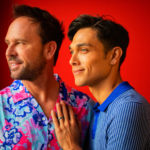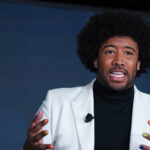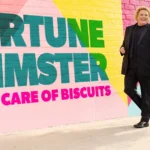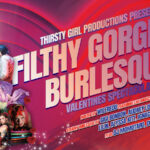This new Broadway production of The Boys In the Band is much more than history reimagined.
Surprisingly, Mart Crowley’s play — now getting a 50th anniversary all-star makeover — has tons to say about who we’ve become as gay men and suggests connections between then and now that speaks volumes about the humanity we share — or choose not to.
Most of the crowds now flocking to see The Boys in the Band during its brief Broadway run were too young to see the original production, which was something of a curiosity when it first hit the stage half a century ago — ten days after Martin Luther King Jr. was killed. The new production (produced by Ryan Murphy, of TV’s Glee and American Horror Story) tries to revisit the play without resetting it in the present. Good choice.
For the uninitiated, Mart Crowley’s play revolves around a group of gay men who gather to celebrate the birthday of one of their own — Harold, played by Zachary Quinto. The fellow throwing the party is Michael (Jim Parsons), and the cast of characters includes an English teacher (Tuc Watkins) and his lover Larry (Andrew Rannells), and Michael’s pal Donald (Matt Bomer). Also along for the very bumpy ride: partygoer Bernard (Michael Benjamin Washington) party crasher Alan (Brian Hutchison) and party favor Cowboy (Charlie Carver). And, as the catalytic for much of the evening’s fireworks, there’s the effervescently effeminate Emory (Robin De Jesús).
Like I am Curious Yellow (which was a sort of Shades of Grey of its day), Boys in the Band was shocking to many. It celebrated openly homosexual men engaging in locker room talk, calling each other “Mary” and including the C-bomb, with limp wrists fluttering in the wind. While the show certainly pricked up ears for its casual references to promiscuity, what really stuck in the minds of many was the verbal savagery with which these supposed “friends” tore into each other.
The 1970 film, which starred the original stage cast, was indeed more fearsome than frolic. Directed by William Friedkin (who would go on to greater fame three years later as the director of The Exorcist), wit transforms into verbal assault early and becomes ever-sharper and more bloodletting as the show progresses. Not so with the new production, where director Joe Mantello lets the barbs float in the air without actually landing anywhere but on the ears of the amused audience.
Mantello achieves something the film does not: there are actual glimpses into how these characters are friends, despite being bruised and self-loathing. Like siblings who love each other, but simply can’t get along, they’re always at each other’s throats with no one adult enough to make them stop. Throughout the show’s 100 minutes, David Zinn’s tastefully gauche set design allows the audience to peer in at the action as things spin more and more out of control.
And what of the marquee names here? Parsons and Quinto electrify, and the play is never better than when they’re squaring off opposite one another. Much of the dialogue remains suspended in time, with a sort of ’60s casting (the play was written while the original Star Trek was still on the air, mind you) that provides spots for the traditionalist (Alan, who may or may not be straight), the African-American, the alien (in this case, the en fuego Emory), the star-crossed lovers and so on.
The supporting cast provides a bouyancy that carries the play ably from near to far shore. Bomer, Rannells, Watkins and Carver all dance deftly between cattiness and camp with precision. More than any one else, Robin De Jesús has his hands full with the lighter-than-air Emory; somehow he remains tethered to the show’s reality often enough to illustrate why the others cherish him so. Watching closely though, it’s easy to see how each exists in his own bubble. Most often they interact without connecting. Whether this was part of Crowley’s original intent isn’t clear, but it is haunting.
Which returns to the original point. Gay men don’t mentor gay men. Every generation feels its way in the dark (no pun intended) on its own because to bond across generations would be . . . ewww, weird. Small wonder they can’t find common ground beyond sex. That said, it’s easy to look at Boys In the Band and see that while society does change, human nature remains remarkably stubborn. And, as the generations between those depicted onstage through the gay rights movement and the AIDS crisis have come and gone, there remains a sense that while gay men really do crave connection, we’re so often entangled in the distraction of attraction, as well as status, competition, envy, and yes … still too regularly caught up in the idea that the coolest people are somewhere else, doing something more glamorous with guys who are more fabulous.
Certainly many more men are happy and comfortable in their same-sex attractions now than in the fading flower-power era of the show. But more than a few are still living out the script Matt Crowley wrote for them in 1968. Will the Boys in the Band ever truly become a band of brothers? Maybe the next 50 years will tell.
Last modified: June 19, 2018

